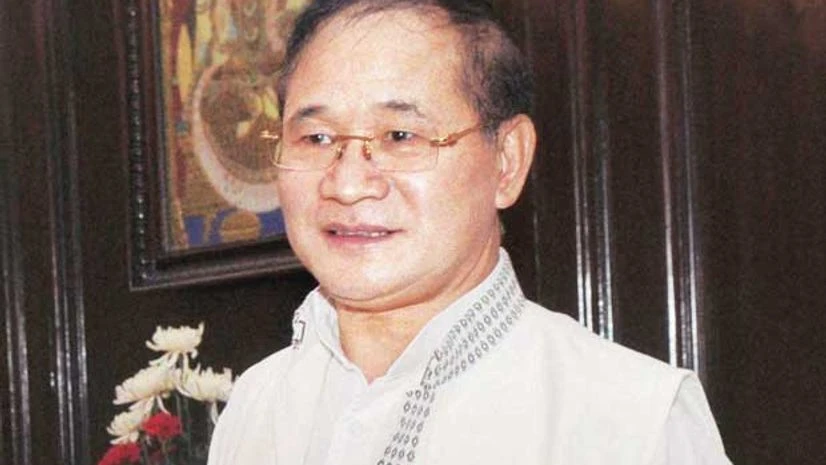The Supreme Court on Wednesday restored the Congress' rule in Arunachal Pradesh and quashed all the orders given by the state's governor last year.
Eventually, President Pranab Mukherjee gave his assent to the Union Cabinet’s recommendation to impose President’s Rule in Arunachal Pradesh. The recommendation, made by the Cabinet after its January 24 meeting, was given the President’s assent through a Proclamation under article 356(1) of the Constitution.
The apex court was hearing a petition on dealing with discretionary powers of the Governor to summon or advance Assembly sessions in the state. Governor JP Rajkhowa had in December advanced the Winter Session of the Assembly without consulting the then chief minister, Nabam Tuki.
Eventually, President Pranab Mukherjee gave his assent to the Union Cabinet’s recommendation to impose President’s Rule in Arunachal Pradesh. The recommendation, made by the Cabinet after its January 24 meeting, was given the President’s assent through a Proclamation under article 356(1) of the Constitution.
The sequence of events:
1) An October 4, 2015, report, published in a national daily, claimed that 37 Congress legislators, including six ministers, had joined hands to try and topple then Chief Minister Nabam Tuki. According to the report, the dissident group was believed to be headed by the state’s former finance minister Kalikho Pul, who was dropped as the state’s health minister and expelled from the Congress for six years in April last year amid allegations of financial mismanagement. The Arunachal Pradesh Congress Committee had dismissed the report.
2) Last November, troubles mounted for the Congress in Arunachal Pradesh as 21 MLAs, who were opposed to the leadership of Tuki, decided to skip a Congress Legislature Party (CLP) meeting to resolve the crisis in the state unit. Striking a blow to Tuki's legitimacy as the CLP leader, the 21 MLAs had said that "any meeting called under his leadership does not carry any substance and holds no water".
3) In December, Governor Jyoti Prasad Rajkhowa advanced the Assembly session from January 14, 2016, to December 16, 2015. Rajkhowa took the decision without consulting Tuki. The governor had also directed the House to consider a motion to replace the Speaker. Speaking on the matter, Congress leader Ghulam Nabi Azad said, "It is a matter of regret that unconstitutional actions are being taken by the Arunachal Pradesh governor on the directions of the central government."
More From This Section
4) On December 16, 20 dissident MLAs from the Congress, along with 11 from the BJP and two Independents, impeached Speaker, Nabam Rebia.
5) On December 17, a no-confidence motion was brought by BJP legislators against the Tuki-led government and the motion was adopted. Kalikho Pul was elected the leader of the legislative party. The impeachment of the Speaker and the no-confidence motion took place on makeshift premises after the government, sensing trouble, had locked the gates of the Assembly.
6) The Gauhati High Court provided the government a breather and stayed all actions of the Assembly till February 2, 2016, and passed strictures against the governor.
7) The Gauhati High Court upheld the directives of Governor Rajkhowa on January 13, 2016. According to The Asian Age, Justice B K Sharma observed, “If in the kind of situation that was prevailing in the Arunachal Pradesh, as highlighted in the petition, the governor took the impugned action, it cannot be said to be unconstitutional so as to warrant interference by the existing power of judicial review under Article 226 of the Constitution of India.”
8) The Supreme Court, on January 14, referred to a constitution Bench a number of petitions arising out of certain orders passed by the Gauhati High Court in the matter.


9) Taking cognisance of the turmoil in the state, the Union Cabinet, in its meeting held on January 24, recommended to the President of India that President’s Rule be imposed in the state.
10) The Congress rebel leader Kalikho Pul was sworn in as chief minister of Arunachal Pradesh with the support of 20 rebel legislators of the Congress and 11 of the Bharatiya Janata Party (BJP) in February 2016.
Implications of President’s Rule:
1) All functions of the Arunachal Pradesh government and all powers vested in the governor under the Constitution or under any law in force in the state, which have been assumed by the President by virtue of the Proclamation of President’s Rule, shall, subject to the superintendence, direction and control of the President, also be exercisable by the governor of Arunachal Pradesh.
2) The state Assembly will cease to function and be put in ‘suspended animation’. The powers of the Assembly are exercised by Parliament or under its authority.
3) The imposition of President’s Rule has to be ratified by Parliament within two months. The proclamation is valid for a period of six months, unless Parliament decides to extend it.

)
